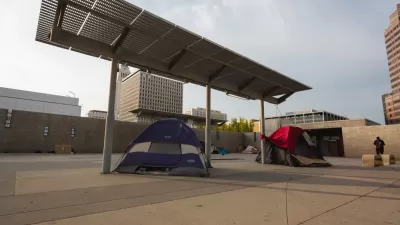Experts are urging cities and counties to develop heat action plans and personalized heat warnings as extreme heat becomes a leading cause of climate-related deaths.

As extreme heat continues to be the leading cause of climate-related deaths in the U.S., experts emphasize the need for improved tracking, response strategies, and community awareness. While the Centers for Disease Control (CDC) reported 2,300 heat-related deaths last year, studies suggest the actual toll may be much higher, with California among the hardest-hit states. Efforts are underway to create more effective heat warning systems, including a new pilot program in California aimed at improving the availability of real-time data on how heat affects individuals, potentially guiding more immediate protective measures in homes, schools, and workplaces.
Communities are exploring various strategies to combat extreme heat, such as planting more trees, increasing access to air conditioning, and establishing cooling centers. However, experts argue that more targeted information is needed to ensure people can make informed decisions about their exposure to heat. Researchers are now studying how individual physiological differences affect responses to heat, which could lead to personalized heat warnings. For example, mobile apps could provide tailored recommendations based on current weather conditions and personal health data to help individuals avoid dangerous heat exposure.
California has already begun implementing its Extreme Heat and Community Resilience Program, which allows local governments and organizations to apply for grants to develop cooling strategies such as increasing shade and making buildings more heat-reflective. In addition, UCLA's new Center for Heat Resilient Communities is spearheading efforts to develop a comprehensive blueprint for building heat-resilient communities. Over the next three years, the program will collaborate with 30 communities nationwide to field-test practical solutions, aiming to help local areas adapt to increasing heat risks and improve public health outcomes.
FULL STORY: Fall is here, but experts say communities need a heat plan

Planetizen Federal Action Tracker
A weekly monitor of how Trump’s orders and actions are impacting planners and planning in America.

Maui's Vacation Rental Debate Turns Ugly
Verbal attacks, misinformation campaigns and fistfights plague a high-stakes debate to convert thousands of vacation rentals into long-term housing.

Restaurant Patios Were a Pandemic Win — Why Were They so Hard to Keep?
Social distancing requirements and changes in travel patterns prompted cities to pilot new uses for street and sidewalk space. Then it got complicated.

In California Battle of Housing vs. Environment, Housing Just Won
A new state law significantly limits the power of CEQA, an environmental review law that served as a powerful tool for blocking new development.

Boulder Eliminates Parking Minimums Citywide
Officials estimate the cost of building a single underground parking space at up to $100,000.

Orange County, Florida Adopts Largest US “Sprawl Repair” Code
The ‘Orange Code’ seeks to rectify decades of sprawl-inducing, car-oriented development.
Urban Design for Planners 1: Software Tools
This six-course series explores essential urban design concepts using open source software and equips planners with the tools they need to participate fully in the urban design process.
Planning for Universal Design
Learn the tools for implementing Universal Design in planning regulations.
Heyer Gruel & Associates PA
JM Goldson LLC
Custer County Colorado
City of Camden Redevelopment Agency
City of Astoria
Transportation Research & Education Center (TREC) at Portland State University
Jefferson Parish Government
Camden Redevelopment Agency
City of Claremont





























